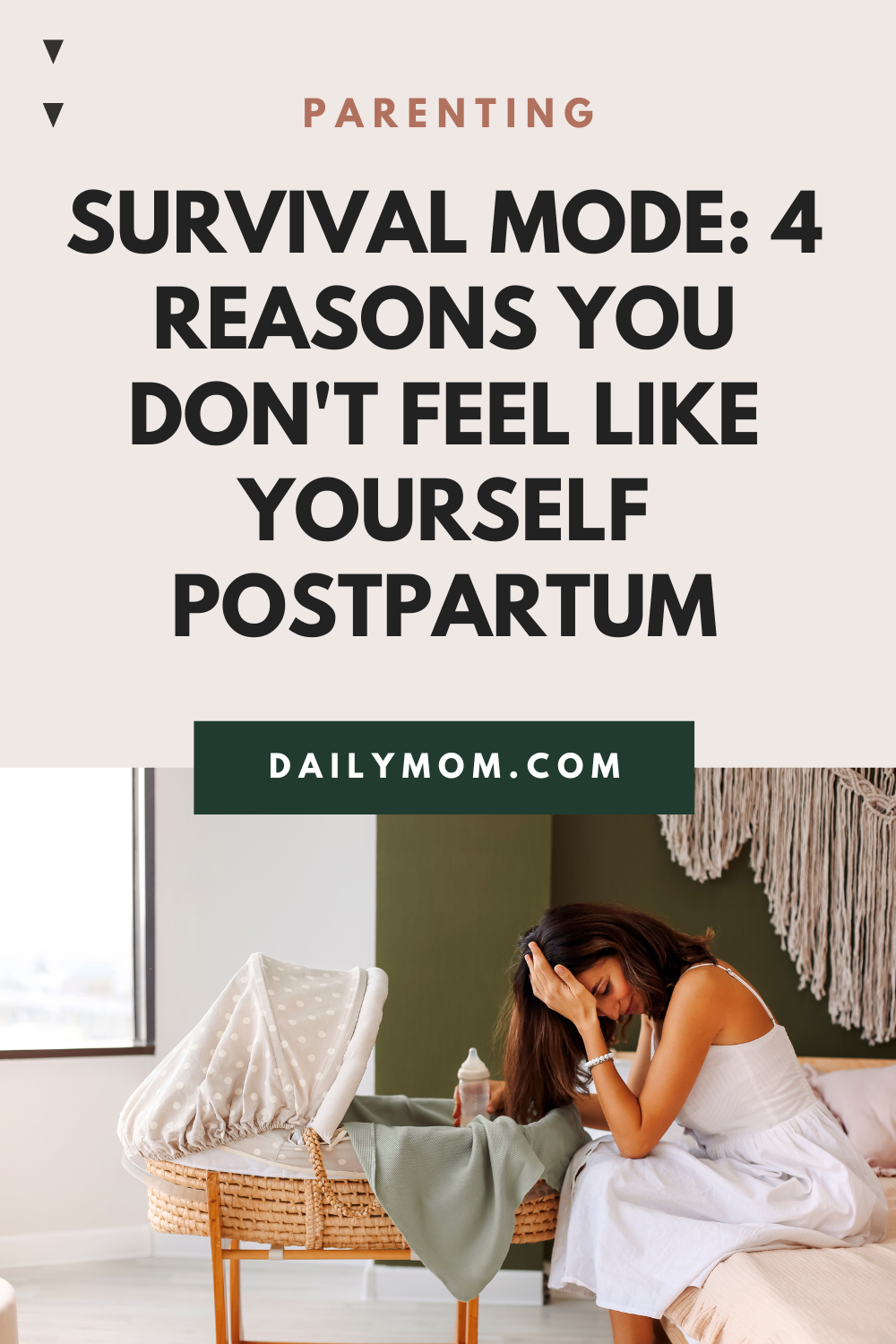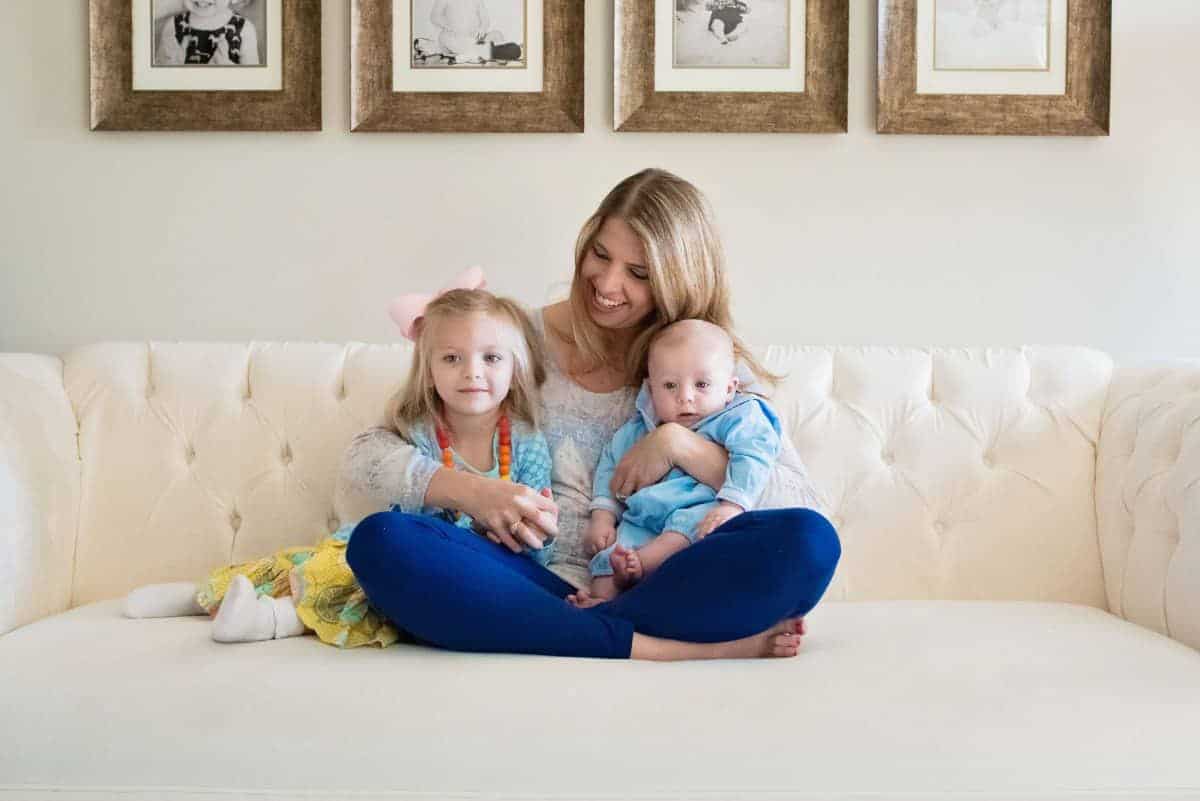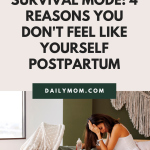It’s so common for women to describe not feeling like themselves even months after having a baby. The fact of the matter is that women often live in survival mode after giving birth, and sometimes, they aren’t able to get out of it for months or even years. While this isn’t the case for all women postpartum, in this article, we will touch on some of the less-known contributing factors that can leave you feeling ‘not quite yourself’ even months after having a baby and draw awareness to resources you might need. Learn these triggers and how to stop living in survival mode.
Handling Trauma Postpartum

Trauma can exist and even thrive when you’re living in survival mode. Do you know what it means to be in survival mode? It is essentially a paused stress response stored in your nervous system from situations that were more dangerous or emotionally complex than you could handle at the time. For example, if someone you were close to passed away when you were very young, and you couldn’t conceptualize grief and loss at the time, your body essentially saves that emotional processing for later.
Sometimes the transition to motherhood, as you begin to raise your own child, can bring up childhood trauma. Research shows that if you’ve experienced trauma as a child, and entered survival mode during childhood, you are five times more likely to develop depression as an adult (Johann Hari, Lost Connections, 2017).
Birth trauma is the other common type of trauma that come to the surface postpartum while a mother is existing in survival mode. When it does, it can lead to symptoms like depression, rage, or anxiety postpartum. If you don’t know how to address the trauma and how to release it from your nervous system, it can really make your emotional life seem volatile and confusing. It’s important to note here that anxiety, rage, and depression postpartum are not always necessarily associated with birth trauma, but they can be root factors. This is where you could involve a postpartum-specific expert such as a therapist or postpartum life coach.
READ MORE: Why Do I Feel Like A Tired Mom All The Time?
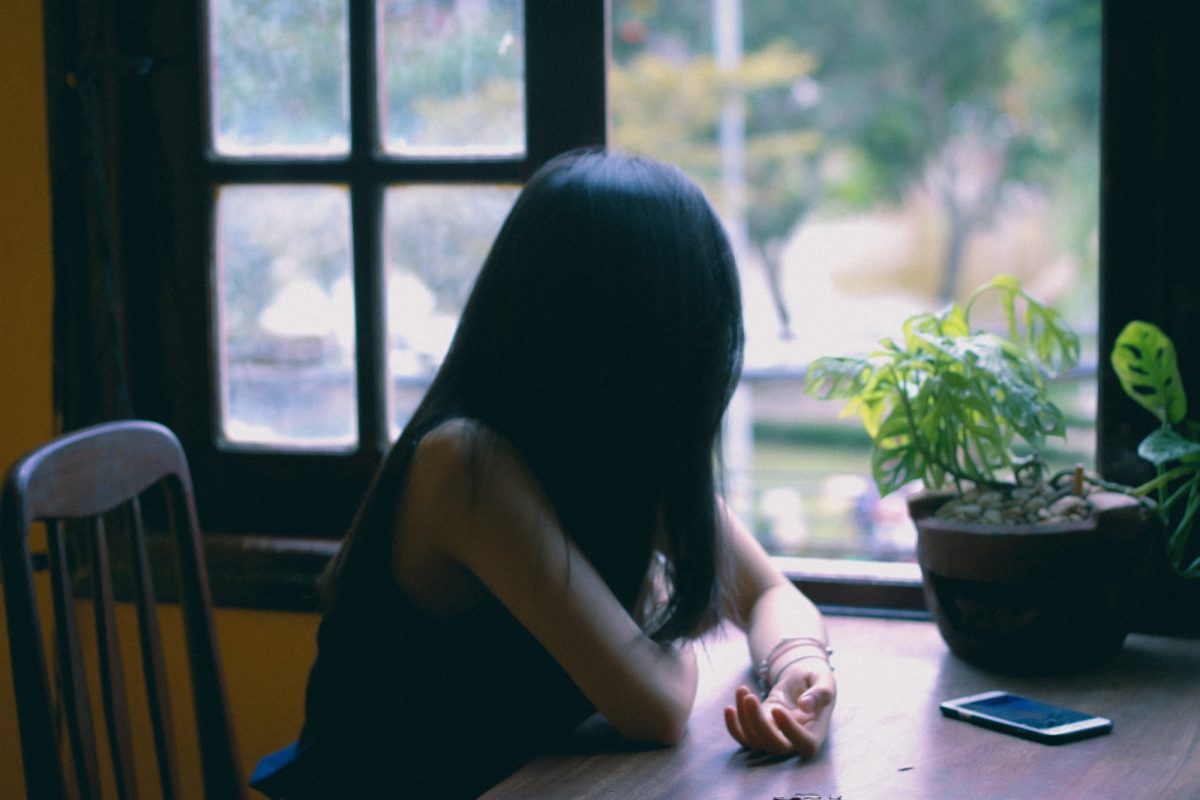
While birth trauma may seem like an obvious thing to infer postpartum, many women either don’t recognize their birth was traumatic, or they get so consumed by taking care of their baby (or babies) while dwelling in survival mode and adjusting to their new life, they never really address the trapped emotions and nervous system trauma that occurred. Here are some examples of common birth and postpartum situations that could actually be a trauma for moms or their partners:
- Having a baby that has to stay or be treated in the NICU can be highly traumatic for the mom. Not just the separation from baby, but all of the logistics so mom can be with baby as much as possible, sometimes pumping breast milk, and feeling torn about neglecting older children or a partner.
- There can also be lingering anger over how care providers responded, or how a partner did or didn’t respond. More emotional processing may need to happen in a safe space with a trusted provider.
- Or even if your birth plan didn’t come to fruition and ideas around how labor and birth should go, can cause underlying trauma if not addressed and recognized.
Sometimes signs of stored birth trauma could be pain that doesn’t leave your c-section scar even after most women don’t feel pain anymore, or a stiff pelvis or painful sex. It’s important to seek a trauma-informed, postpartum–specific therapist, life coach, or other provider when discussing traumatic moments. There is no shame in these feelings and the sooner you are able to address and move past them the sooner you can heal.
Read More: Temper Tantrums: How To Be a Calm & Positive Mom in 5 Simple Steps
The Kundalini Awakening

Eastern philosophies of energetics assert that there is a Kundalini awakening that often happens either when a woman becomes sexually active, or during the process of childbirth (as well as at other times of life). While some believe a Kundalini awakening is rare, it can be something that contributes to women living in survival mode emotionally or not feeling like themselves postpartum.
What is a Kundalini Awakening? According to Tantra, a Hindu or Buddhist text that dates back to the 7th century, Kundalini is a coil of divine feminine energy that rests at the base of the spine, near the root chakra. The philosophy is that we are all born with this energy coil, but it is ‘awakened’ for some during this life. The connection to a Kundalini Awakening and childbirth is made when considering that vaginal birth passes right through the root chakra, which is right near this divine energy coil. Hence, childbirth is thought to sometimes spark this energetic shift or spiritual awakening for a woman.
While a Kundalini Awakening is likely an overall good thing, this new Divine Feminine, creative energy brings about a lot of change, which can be dysregulating to the nervous system, especially amidst all of the other major life changes already taking place postpartum. Here are some ways this phenomenon can look postpartum, or any time it occurs.
The person experiencing Kundalini energy for the first time may:
- Experience a heightened awareness of intuition
- Feel a new, deeper sense of purpose and destiny
- Feel the urge to make life changes
- Experience physical and emotional changes like sleep disturbances, anxiety, surges of energy, and shaking
- Experience feelings of blissfulness
- Experience enhanced psychic abilities
- Feel increased compassion and empathy
- Feel increased creativity
- Feel increased spiritual connection
Some of these cross over with what a lot of women experience postpartum. If you think this is something you’re experiencing, we recommend you seek the support of an experienced yoga instructor or Guru, specifically one that understands the energy body and kundalini energy. Here is a directory of Kundalini-certified Yoga teachers and gurus.
Read More: What is Normal Postpartum Hair Loss?
Survival Mode In Life: Sleep Deprivation
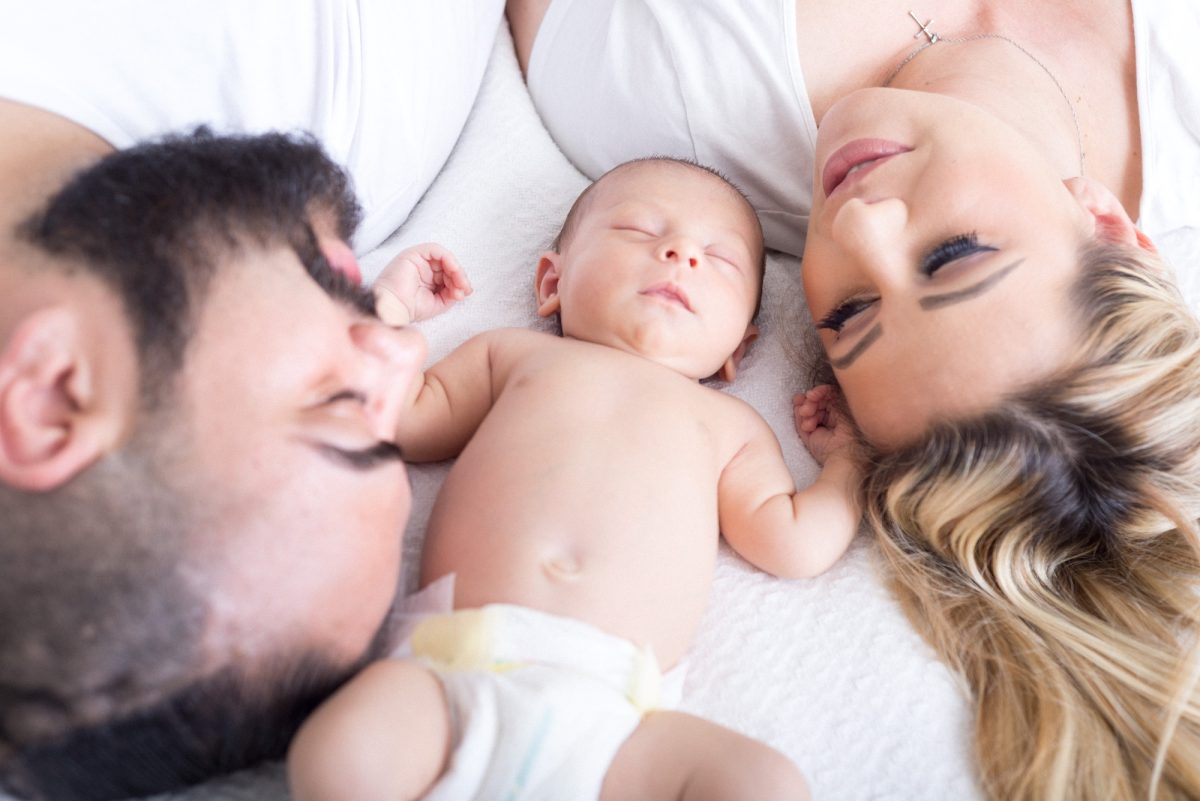
While most postpartum women expect some degree of sleep deprivation in the first year or so, it can be difficult to really see the effects of it on yourself, especially if you’ve gotten used to existing in a survival mode mentality and get fewer-than-ideal hours of sleep each night. First-time mothers are especially vulnerable to getting even less sleep than necessary and often have night-waking feeds.
If you think sleep deprivation could be contributing to any struggles with not feeling normal, overwhelming tired, short-tempered, or adjusting postpartum, take steps to get more rest. Start by making an effort to prioritize sleep no matter how busy you are or how many tasks are on your list. Look at what will help you maximize the amount of sleep you can get each night, such as: Taking a power nap during the day, breaking up long nights into two shorter shifts of sleep, napping in the car with your baby while running errands, or creating a winding-down routine before bedtime.
Every mom is different and you may need to experiment to find what works best for you and your family. Most importantly, give yourself grace and understand that it can take time to figure out how to get more sleep as a new parent. Learn how to break the endless cycle and ask for help when you need it. Don’t wait till you get to your breaking point to reach out for help.
READ MORE: Postpartum Anxiety: My Life-Changing Experience With Postpartum Anxiety And Why I Didn’t Know I Had It
Expectations While Living In Survival Mode

Social media and older generations of women tend to mostly highlight the good and beautiful aspects of becoming a mother. However, there is a dark side to motherhood that, if we aren’t real about it with ourselves and others, can leave us feeling isolated and guilt-ridden in our postpartum adjustment. Your struggles can seem misplaced during this time, and knowing that you are not alone with your feelings is important. A survival mode worksheet can help you sort through these feelings and provide a sense of relief knowing you are not losing your mind.
While we don’t want to only focus on the negative, having realistic expectations can sometimes help put our own struggles in perspective. Consider some of these podcasts to listen to as a new (or seasoned) mom. Alternatively, you could search #postpartumdepression and other hashtags on Instagram to start to create a sense of community and support for yourself, as well as validation and not feeling alone.
If you’re really struggling postpartum, you’ll likely be needing more than just validation from other moms’ stories. Again, we recommend resources and emotional support. Find qualified postpartum providers like doulas, coaches, or therapists. Last but not least, you can type your zip code into Psychology Today’s search for postpartum therapists in your area.
Read More: Coping With Postpartum Pain Without Pain Medication
If you aren’t feeling like yourself after having your baby (or babies), you are definitely not alone. Not only have you created life and given birth, but you have transformed into a mother and have to learn and grow in this new role. Learning to recognize these factors and knowing there are helpful resources that can get you one step closer to the help and support that could uplift you at this delicate, amazing time, can be lifesaving. You’ve got this, mamma. And things can get feeling better.
postpartum life coach link | postpartum therapist link
WANT TO READ MORE?
When I Knew It Was Postpartum Depression and I Needed Help
CONNECT WITH DAILY MOM
💖 NEWSLETTER: DAILY READS IN YOUR INBOX 💖
Sign up to receive our picks for the best things to do, see and buy so you can relax and focus on more important tasks! Let us help you be the best version of yourself you can be!
BE SOCIAL WITH US
📌 LOVE IT? PIN IT!📌
